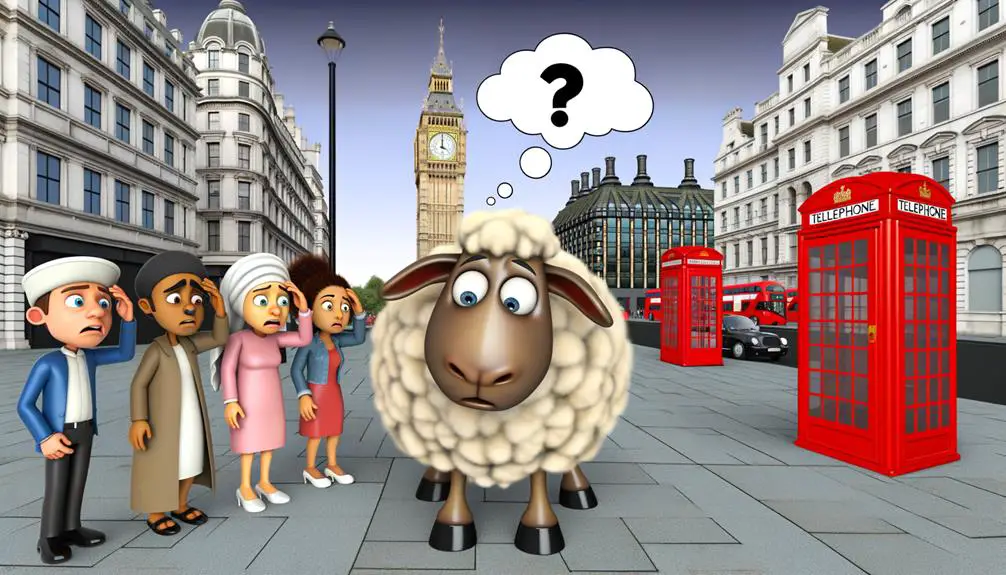In British slang, you might hear the word 'berk' thrown around quite a bit. It's a term that comes from a playful twist of language, specifically Cockney rhyming slang, where 'Berkshire Hunt' is shortened to 'berk'. This transformation showcases the inventive nature of slang, making 'berk' a less obvious insult that translates to calling someone a fool or idiot. It's widely used across various forms of media, including TV, films, and music, indicating its solid stance in British culture. Depending on where you are, the term can vary in its level of offense, but it's generally taken lightly. Unraveling the depth of 'berk' offers insight into the linguistic richness and social dynamics within Britain.
Key Takeaways
- 'Berk' in British slang means a fool or idiot, derived from Cockney rhyming slang.
- It originates from the phrase 'Berkshire Hunt', highlighting its playful linguistic creation.
- The term can be used playfully or as a subtle critique, depending on context.
- Its offensiveness varies by region, reflecting different cultural perceptions.
- 'Berk' is integrated into various forms of media, indicating its cultural significance.
The Origins of 'Berk'

Fascinatingly, the term 'berk' originates from Cockney rhyming slang, where it's derived from the phrase 'Berkshire Hunt,' cleverly shortening and altering its meaning in a manner that's both subtle and sharp. This linguistic evolution showcases the playful yet intricate nature of rhyming slang, a hallmark of British linguistic creativity. You'll find that rhyming slang operates by replacing a common word with a phrase that rhymes with it, only to then typically shorten it, making the connection between the original word and its slang counterpart less obvious to the uninitiated.
The exploration of 'Berkshire Hunt' to 'berk' exemplifies this process, where the initial harshness of the intended insult is veiled beneath layers of linguistic innovation. This adaptation isn't just about linguistic playfulness; it's a reflection of the dynamic nature of language and how cultural and social influences shape the evolution of words. As you investigate further into the origins of 'berk,' it becomes clear that rhyming slang serves not only as a method of communication but also as a reflection of societal attitudes and a medium for cultural expression. This evolution from a phrase to a single word illustrates the complexity and adaptability of language, underscoring the importance of context, nuance, and social dynamics in understanding the true meaning behind the words we use.
Common Misconceptions
You might believe 'berk' serves solely as an insult within British slang, yet this interpretation barely scratches the surface of its complexity. Its origins are frequently misunderstood, stemming from far more intricate roots than commonly assumed. Additionally, the severity of the term varies greatly, challenging the notion that it carries a uniform level of offense.
Not Just Insulting
Contrary to popular belief, the term 'berk' in British slang isn't solely derogatory and can, in specific contexts, convey affectionate teasing among close friends. This nuanced usage reflects its essential cultural impact and the social perception that surrounds it. While 'berk' might initially seem harsh to the uninitiated, those familiar with its colloquial nuances understand it as a term that can also express endearment, particularly within the dynamics of British humor. This duality is vital in comprehending its application and significance within conversations. It's not just the word itself but the intent and relationship between those involved that dictate whether it's taken as an insult or a playful jest, showcasing the complexity and adaptability of language in social interaction.
Origins Misunderstood
Isn't it curious how the true origins of the term 'berk' are often shrouded in misconceptions and inaccuracies? You might think it's just another inquisitive jab, but investigate a bit further, and you'll uncover a rich tapestry of social implications and linguistic evolution. The term's roots are more intricate and potentially offensive than many realize, yet its transformation over time reflects society's changing values and attitudes. This evolution is an integral part of understanding why 'berk' carries the weight it does today. Misunderstanding its origins does a disservice to the nuanced ways language and culture intersect, leading to oversimplified interpretations that overlook the depth of its historical context and the intricacies of its usage within various social settings.
Severity Varies
Many people mistakenly believe the severity of calling someone a 'berk' is universally understood, overlooking the significant variations in its perceived offensiveness across different contexts and regions. You should be aware that the cultural impact and linguistic evolution of slang, including 'berk,' contribute to these disparities. In some areas, it's a mild, almost affectionate jab, reflecting a playful, teasing interaction rather than genuine insult. However, in others, its origins—rooted in rhyming slang for a much cruder term—lend it a sharper edge. This divergence underscores the importance of understanding local sensibilities and the dynamic nature of language. As slang evolves, so too does its acceptability and impact, making 'berk' a fascinating study in linguistic fluidity and social attitudes.
Etymology and Meaning
You'll find that the origin of 'berk' is steeped in a rich tapestry of linguistic evolution, tracing back to Cockney rhyming slang. This term's journey from its inception to becoming a staple in British slang illuminates its nuanced meaning in contemporary usage. Understanding its roots provides you with a clearer insight into how and why it's wielded in conversations today.
Origin of Berk
Delving into the etymology of 'berk,' it's derived from Cockney rhyming slang, where 'Berkshire Hunt' is shortened and euphemized to 'berk,' ultimately meaning a fool or idiot. This linguistic evolution showcases the playful and inventive nature of Cockney rhyming slang, a vernacular form deeply embedded in the cultural fabric of London's East End. The transformation from 'Berkshire Hunt' to 'berk' illustrates a unique method of obfuscation and indirect reference, characteristic of Cockney rhyming. Such linguistic creativity not only enriches the English language but also encapsulates the wit and humor inherent in British slang. By tracing 'berk's origins, you're getting a glimpse into the dynamic, evolving nature of language and how societal and cultural influences shape the words we use.
Slang Usage Explained
In exploring the etymology and meaning of 'berk,' it's imperative to understand its roots in Cockney rhyming slang, where it subtly conveys a derogatory label without overt offense. This term's linguistic evolution is fascinating, evolving from its original form into a word that's both playful and sharp. Its journey from the backstreets of London to widespread British vernacular showcases a significant cultural impact, reflecting changes in societal attitudes towards language and propriety. As 'berk' integrates into common speech, its original harshness softens, yet it retains a cheeky edge. This transformation underlines the dynamic nature of language, highlighting how expressions evolve and adapt, influenced by cultural shifts and the need for nuanced communication.
Usage in Popular Culture

The term 'berk' has woven its way into popular culture, often surfacing in British television and film with a nuanced blend of humor and derision. You'll find it's not just thrown around in casual conversations but has also made its mark through celebrity endorsements and music references, showcasing its versatility outside of mere slang. This integration into various mediums has solidified its place in the cultural lexicon, allowing it to be both a playful jab and a subtle critique depending on the context.
| Medium | Example | Significance |
|---|---|---|
| Television | 'Peep Show' | Characters frequently use 'berk' in comedic scenes. |
| Film | 'Lock, Stock and Two Smoking Barrels' | 'Berk' adds to the gritty realism and humor. |
| Music | Lyrics in British punk rock | Emphasizes rebellion and disdain. |
| Literature | British novels and comics | Used to add authenticity to dialogue. |
| Celebrity Use | Interviews and social media | Endorses the term's playful nature in public life. |
Through these avenues, 'berk' remains a staple in British pop culture, its use both shaping and reflecting societal attitudes. It's a sign of the word's flexibility and enduring appeal, maintaining relevance across generations.
Regional Variations
How does 'berk' vary across the UK's diverse regions, and what might these differences tell us about local dialects and cultural nuances? Across the British Isles, 'berk' isn't just a blanket term; its use and reception can shift dramatically, offering a fascinating lens through which to view regional linguistic identities. These variances are not just about pronunciation but also about the degree of offense it might convey and its dialectal acceptance in casual conversation.
In some areas, 'berk' is a mild, almost affectionate admonishment, while in others, it carries a sharper sting, reflecting deeper cultural perceptions of rudeness or vulgarity. This dichotomy underscores the complexity of British regional dialects and how a single word can encapsulate a web of social dynamics, including factors such as class, age, and the rural-urban divide.
- Dialectal acceptance: How widely 'berk' is used and accepted.
- Cultural perception: The degree to which 'berk' is considered offensive.
- Urban vs rural usage: Variations in use between cities and countryside.
- Generational differences: How acceptance of 'berk' changes with age.
- Class connotations: The role of social status in the word's reception.
Understanding these nuances offers a deeper insight into the UK's linguistic landscape, highlighting how words like 'berk' are more than just slang; they're markers of identity and heritage.
Tips for Contextual Use

Traversing the nuanced terrain of 'berk's contextual use, you'll find understanding its regional and social subtleties is essential for its appropriate application. As a term that straddles the line between playful jest and potential offense, knowing when and how to deploy it is key. In informal settings among close friends, 'berk' can serve as a lighthearted jab, eliciting chuckles rather than frowns. However, in more formal contexts or among acquaintances, its use could be misconstrued, leading to awkward conversational reactions or even offense.
To navigate these waters, consider the tone and dynamics of the situation. If there's any doubt about how your words might be received, opting for polite alternatives is a wise choice. Phrases like 'silly goose' or 'daft' can convey a similar sentiment without the risk of crossing a social boundary. Paying attention to the conversational reactions of those around you is also key. A puzzled look or a sudden coolness in the conversation could be a sign to steer the chat back to safer waters. Ultimately, wielding 'berk' with sensitivity to context and audience will guarantee your intended humor isn't lost in translation.
'Berk' in Modern British Society
In modern British society, 'berk' has evolved to occupy a unique niche, often reflecting the speaker's intent and the listener's perception with remarkable subtlety. Its usage can vary widely, from a light-hearted jest among friends to a more biting critique in a heated moment. Understanding the berk pronunciation is vital, as it can influence the term's impact. The way it rolls off the tongue, with a certain British lilt, can either soften the blow or sharpen the barb.
The social impact of 'berk' cannot be understated. It's a term that:
- Bridges generations, being understood and utilized across a wide age range
- Reflects the classically British penchant for understatement and irony
- Can diffuse tense situations when used humorously
- Might enforce social norms by calling out behavior deemed foolish or inconsiderate
- Can, however, alienate or offend if misused or misunderstood
Your understanding of 'berk' and its application in conversation illustrates not just a grasp of British slang, but an insight into the nuances of British social interaction. As language evolves, so does the term's relevance, mirroring changes in society's attitudes and the ever-shifting landscape of colloquial English.
Future of the Term Berk

Predicting the trajectory of 'berk' in British vernacular requires understanding its current status and potential for adaptation. You'll find that 'berk' has firmly entrenched itself within the lexicon, embodying a uniquely British blend of affectionate chide and pointed critique. However, its future is not set in stone. The forces of global influence and linguistic evolution are at play, shaping 'berk' in ways that could either cement its place or render it a relic.
As you consider the global influence, it's important to recognize how English, as a language, absorbs and adapts. 'Berk' might find new life in different cultures, its meaning nuanced but recognizable. Alternatively, the rapid pace of online communication and media consumption could dilute its distinctiveness, blending it into the broader tapestry of English slang without its British particularities.
Linguistic evolution, too, plays a critical role. The natural progression of language, influenced by social dynamics, technological advancements, and generational shifts, could see 'berk' evolve in meaning. It might soften further, becoming an even more benign term of endearment, or perhaps take on a sharper edge, depending on societal attitudes and contexts.
In essence, while 'berk's' roots are deeply British, its future will likely be shaped by the interplay of global connectivity and the ever-evolving nature of language itself.







